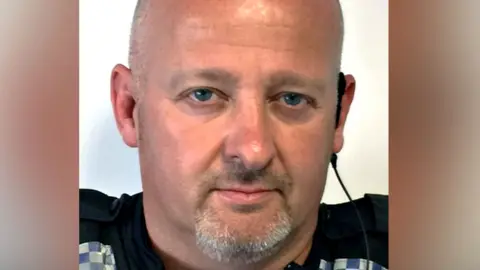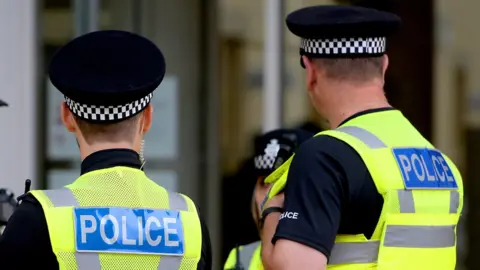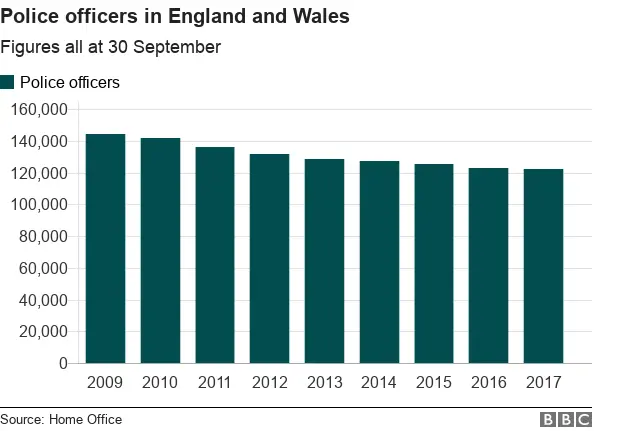Police shortages: 'Working alone left me with PTSD'
 POLICE FEDERATION OF ENGLAND AND WALES
POLICE FEDERATION OF ENGLAND AND WALESThe day PC Mick Johnson confronted a knifeman changed his life forever.
Stabbed in the arm in the 2017 incident in Hartlepool, it left him suffering post-traumatic stress disorder (PTSD).
He says staff shortages caused by cutbacks left him no choice but to operate alone that day.
A Police Federation of England and Wales (PFEW) survey found nearly 90% of officers say they are under-staffed. The Home Office says it wants to ensure forces have the necessary resources.
The PFEW survey is the only national policing study of its kind, and 18,000 officers of all ranks took part. The first one was conducted in 2016.
The survey also found:
- 79% of officers have experienced feelings of stress and anxiety in the previous 12 months, with 94% of those saying their job made it worse
- Almost every officer has been exposed to at least one traumatic experience in their career, with 61.7% suffering at least one in the last 12 months
- 43.9% reported they viewed their job as very or extremely stressful, up from 38.6% in 2016
PC Johnson's confrontation with that knifeman two years ago utterly changed him as a person.
"I was off [work] for only three weeks, but later suffered from mood swings, short temper and lack of sleep," he said.
"I eventually sought help and was diagnosed with PTSD. I have received counselling for this and although the memory is still with me, I try not to let it affect me."
Recalling what happened, PC Johnson said he was sent to investigate reports of a man acting strangely in a shop.
"There was no-one else available, so I attended."
He was attacked by the knifeman while trying to rescue a shopkeeper.
"I tried to keep him calm, but after a few minutes he produced a large kitchen knife from his pocket and moved towards me with it."
The 49-year-old works as a response officer and said: "I have been on this unit since 2009, and it has shrunk from 18 to 20 officers down to about 10.
"It's incredibly frustrating not being able to do the job that I still love. I joined to help people and catch criminals and prevent crime, but I spend most of my time dealing with concerns for safety."
A detective constable in the north of England, he said the stress of his job nearly ended his marriage.
"I had a breakdown at work in 2018 and was diagnosed with stress-related secondary trauma, solely down to working numerous 18-hour days to manage my workload," he said.
"My wife told me after I had been signed off sick that she was one more big job away from divorcing me."
He added that he is counting down the days to his imminent retirement and had 10 other colleagues who are looking to leave.
"We are all devastated, as we joined to protect our communities and to serve the public, we didn't expect to have to sacrifice our families and our physical and mental health."

Analysis
By home affairs correspondent Danny Shaw
A policeman's lot is not a happy one.
That line, penned 140 years ago by Gilbert and Sullivan for their opera Pirates of Penzance, has never been truer than it is today.
The Police Federation survey paints a picture of an over-burdened and stressed-out workforce that doesn't much enjoy life: the average rating for "life satisfaction" was 5.6, lower than the armed forces and the general population.
Those who are more content at work are probably less likely to respond to a study of this kind, so that needs to be taken into account when assessing the conclusions.
Police work is also, by its very nature, a demanding job and always will be.
Nevertheless, the findings indicate that the sharp reduction in police officer numbers is biting very hard.

 PA
PAPFEW's national vice-chairman Che Donald said that the survey's results "should be a huge red flag to the government, chief constables and the public".
He added: "The police service's most valuable resource is its people.
"Officers are stressed, exhausted and consistently exposed to things people should never have to see - and these results show just how much it is taking its toll."
Policing minister Nick Hurd said: "We take the wellbeing of police officers and staff very seriously, which is why we launched the Front Line Review to listen to their concerns and have invested £7.5m in a new national police wellbeing service.
"I am delighted that Parliament has approved our funding package for next year.
"This funding settlement recognises the demands on police forces, and police and crime commissioners are already setting out plans to recruit more officers as a result.

Since 2010, central government funding to police forces has been cut by almost a third, in real terms, leading the number of officers to fall by 21,000.
In December, the government announced an extra £300m to help pay for pension expenses and other costs for police forces in England and Wales.
Chief Constable Andy Rhodes, from the National Police Chiefs' Council, said: "Police chiefs will look carefully at the findings of this survey, which provides valuable feedback and reiterates the extremely challenging situations and environments our officers face every day.
"It is vitally important that they receive support and care because, as a society, we have an obligation to look after the men and women whose job it is to keep us safe."
The number of police officers in Scotland fell to a nine-year low of 17,170 in May 2018, while in Northern Ireland there has been a smaller decrease since 2010 than in England and Wales.
